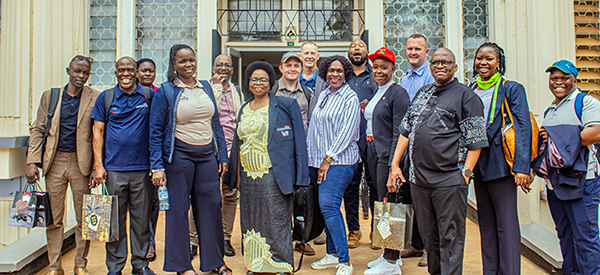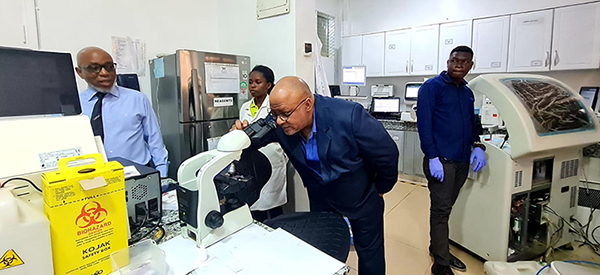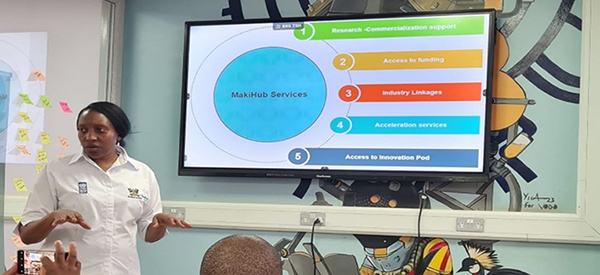News & Media
Partnering to leverage work-integrated learning as a gateway to the world of work

The Unisa delegation visiting the research hospital and clinic
As reported last week, a Unisa delegation comprising the Department of Tuition Support and Facilitation of Learning, and college and regional representatives, recently embarked on a work-integrated learning (WIL) benchmarking visit to Makerere University to build on the foundation of a memorandum of understanding entered into by both universities.

The Unisa delegation visiting the veterinary clinic
WIL as gateway to the world of work
During the engagement, presentations from both Unisa and Makerere University revisited institutional approaches to aspects of graduate unemployment, shelved research and limited knowledge transfer that hinder the implementation of successful support mechanisms for innovation and institutional committee policies to combine career and industry foci with service learning that values community-oriented solutions for Africa.
With this shared vision, Unisa delegates and Makerere University staff members highlighted that the inter-institutional partnership could drive sustainable development through education, setting trends to transform higher education for Africa’s future, allowing graduates to be innovative and create employment.
Unisa colleges showcased WIL initiatives and highlighted gaps and opportunities in the various colleges aligned with the envisaged collaboration. Makerere University staff were attentive and keen to pursue collaboration with Unisa, particularly regarding entrepreneurship opportunities.
Prof Robert Wamala, Head of Graduate Studies at Makerere University, provided a glimpse into the institution’s strategy and mentioned the Makerere University Innovation Pod (MakUniPod). At this facility, student and staff ideas are incubated. Start-ups are conceived in the university’s bid to inculcate entrepreneurship among staff, students and the community at large to solve societal problems.
Wamala emphasised the importance of funding for WIL and that projects must be tailored to meet societal needs. The Office of the Dean of Students supports the Makerere Policy on Students’ Work Scheme, whereby students provide internal services such as cleaning in exchange for pay; they also do administrative work and work in the Law Clinic as examples of this work scheme.
The audience was reminded that universities need to give opportunities to students, as they are the first in line to do so, and that the bridge between professors and technical students must be built. Unisans also learned about the various forms of WIL in use at Makerere University.
A campus tour included a visit to the research hospital and clinic, the veterinary hospital, the library, and the College of Computing and Information Sciences, where several short presentations were provided on topics such as the use of AI to support students and the development of air pollution detectors.
A closer look at the MakUniPod and Innovation Hub
The Unisa delegation visited the MakUniPod and Innovation Hub. It aims to train students with entrepreneurial skills in university, high school, and primary school. It offers business incubation facilities and facilitates market access for the student businesses supported by the MakUniPod. The facility is also open to non-registered students and the surrounding communities in Makerere and the country at large.
The MakUniPod is marketed extensively on the national media outlets, in newspapers and during exhibition events organised by the university. Most of its services are free of charge. It assists with registering intellectual property, trademarks, and copyright, among others. It accommodates about 10 market spaces ranging from rapid prototyping, design labs, textile, and embroidery to food tech. It also facilitates linkages with commerce and industry and the placement of internship students. The facility also supports WIL for its students and small businesses and incubates entrepreneurial ideas. This is a high-impact initiative in reducing graduate unemployment that Unisa can learn from. With an MoU in place, Unisa students can, as part of the MoU, use the MakUniPod facilities.

Dr Cathy Ikiror Mbidde, Acting Manager of the MakUniPod and Innovation Hub
Dr Cathy Ikiror Mbidde, Acting Manager of the MakUniPod and Innovation Hub, introduced the importance of innovation and forecasting to nurture professionals in the Industry 4.0 space, and how opportunities should support the development of market-ready students and support mechanisms that are policy-adjacent to institutional and national implementation.
Further opportunities include the inclusion and acknowledgement of start-ups and sustainability, as well as the importance of African universities driving sustainable development through education, pedagogy, ideation, and linking industry with local communities. These areas also illustrated how Makerere University and Unisa initiatives can shape policies through student work schemes, grant administration, knowledge transfer partnerships, and responses to societal challenges, industry uptake and acceleration. Presentations and discussions also addressed institutional approaches to aspects of graduate unemployment, shelved research and limited knowledge transfer that hinder the implementation of successful support mechanisms for innovation and institutional committee policies to combine career and industry foci with service learning that values community-oriented solutions for Africa.
The way forward
The two universities agreed to jointly work on a book examining WIL in the higher education sector, which will be authored by representatives of both Makerere University and Unisa, along with colleagues from various institutions across the globe. This book will address key themes in this discourse, such as employability and entrepreneurship, and will increase Unisa’s footprint in seeking solutions to African problems. A project plan was also prepared for the key milestones of this book’s progress, with prospective authors and editors approached for their roles and contributions.
In light of conversations on WIL and how it can yield opportunities in institutional areas of curriculum co-creation, community engagement strategies and alumni-network leverage, Delegates indicated that the visit to Makerere University has provided an insightful overview of the university’s profile and how student and industry relationships can expand access to students, stakeholders, management, and communities through education. Emphasis was placed on the value of knowledge-sharing at a transnational level, particularly considering aspects of quality assurance, the importance of stronger partnerships with industry, the value of structured guidelines in supervision, mentoring and the development of inclusive policies and support mechanisms to ensure fair and equitable access in open and distance e-learning.
* Prepared by the DTSFL delegation, regional staff delegates and college delegates
Publish date: 2025/06/23

 Unisa co-hosts G20 community outreach in the Eastern Cape
Unisa co-hosts G20 community outreach in the Eastern Cape
 Unisans gain membership of prestigious science academies
Unisans gain membership of prestigious science academies
 Advocating for disability transformation through servant leadership
Advocating for disability transformation through servant leadership
 Unisa Press continues to illuminate the publishing space
Unisa Press continues to illuminate the publishing space